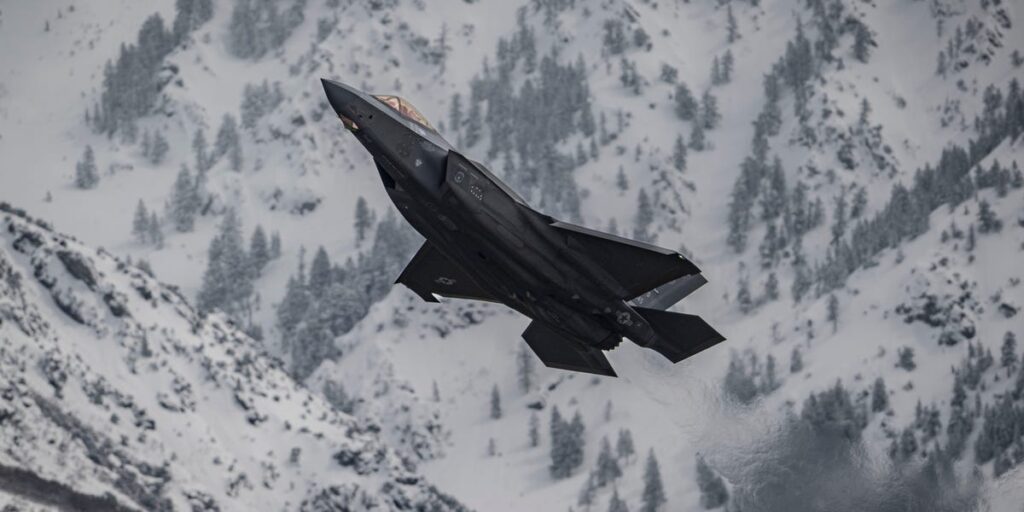Switzerland said it might scale back its order of US-made F-35 fighter jets after failing to fix the price in its negotiations with the White House.
Amid shifts in US attitudes toward allies and partners, some Western nations have questioned the jet and, in at least one case, even rejected the fifth-generation fighter for European alternatives. Switzerland still wants the F-35, considering its high-end capabilities, but it may cut its order.
Switzerland said that attempts to negotiate a fixed price for the F-35A fighter jet, made by the US’s Lockheed Martin, were unsuccessful, with higher costs expected as a result.
Switzerland may now order fewer F-35s, the defense minister, Martin Pfister, said in a press conference on Wednesday, per Swiss newspaper Tages-Anzeiger. He said that other options include asking parliament for another loan for the jets and deducting operating costs from the purchase price, among other possibilities.
Switzerland committed to buying 36 F-35As after signing a contract in 2022, with the jets expected between 2027 and 2030. However, Pfister said the defense department must now examine whether that figure is really what the country needs.
Switzerland’s government explained in a press release on Wednesday, that while options were on the table after failed negotiations with the US, Switzerland remains committed to procuring F-35As, citing “a significant technological advantage over other aircraft” that would help “to protect Switzerland from airborne threats.”
Pfister said that Switzerland must continue the procurement of the jets, or else it won’t have the defense it needs by the early 2030s.
The Swiss government described the US government’s actions in negotiations as an “abandonment of the fixed price.” It previously viewed the price as fixed at what is now $7.2 billion.
In a situation without a fixed price where the cost is subject to volatility as a result of inflation and tariffs, Switzerland is unable to determine the total price of its procurement. It says that the additional costs for procuring the jet could be more than $1.6 billion, which would represent a tremendous cost growth.
The government said that the unsuccessful negotiations were with senior White House representatives and that there was a conversation between Pfister and US Secretary of Defense Pete Hegseth. It said “the discussions clearly showed that the USA is not prepared to deviate from its position.”
The Swiss defense department was thus instructed to consider other options by the end of November, with the government saying the department “will examine whether current air defence requirements still correspond to the principles on which the evaluation of the F-35A was based.”
Lockheed Martin told Business Insider in a statement that “since foreign military sales are government-to-government transactions, questions about F-35 cost, schedule and procurement are best addressed by the armasuisse and US government.”
Switzerland is a neutral country, and while it’s not a member of NATO, it is seen as a partner nation and has deepened its cooperation with the alliance since Russia’s invasion of Ukraine.
While it remains committed to the F-35, some US allies are no longer sure.
Some wavering on the F-35
NATO member Spain said last week that it would not buy the F-35 and would instead focus on European alternatives.
The country’s decision came after some other allies publicly questioned the fighter jet amid Trump’s treatment of allies, which has included criticizing the NATO alliance and European defense spending.
Trump’s approach to the alliance and questions of US reliability, amid growing security concerns, has sparked a new focus within Europe on investing in the continent’s defense firms.
Politicians across all of Switzerland’s political parties said earlier this month that the country should withdraw or reconsider its planned purchase of F-35s in response to Trump’s tariffs.
So far, Spain is the only ally to formally step back from the jet, which is used by 19 US partner nations.
The F-35 is a top-class fifth-generation fighter that many nations want, and any country that steps away from it after already committing to it would likely encounter huge costs and logistical issues, among other challenges.
The jet’s widespread use among allies and partners is also an advantage. It lets militaries operate together more easily, something that could be key in a conflict on the continent. The Swiss government noted that its desire for the jet is driven by how widespread F-35 usage is across Europe.
But Europe’s view of the US has changed. When asked on Wednesday if the US is seen as a reliable partner for future arms purchases, Pfister responded by saying that they are not reliable when it comes to tariffs. The depth of that concern is unclear.
Read the full article here


